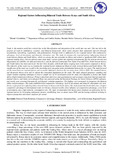Please use this identifier to cite or link to this item:
http://ir-library.mmust.ac.ke:8080/xmlui/handle/123456789/2440| Title: | Regional Factors Influencing Bilateral Trade Between Kenya and South Africa |
| Authors: | Njeru, Stalin Mwenda Okoth, Pontian Godfrey Kimokoti, Sussy Namaemba |
| Keywords: | Regional, Factors, Influencing, Bilateral, Trade, Africa |
| Issue Date: | 6-Nov-2023 |
| Publisher: | AFRICAN JOURNAL OF EMPIRICAL RESEARCH |
| Abstract: | Trade in the modern world has evolved due to the liberalization and integration of the world into one unit. This has led to the practice of trade in multilateral, regional, and bilateral frameworks where states advance their diplomatic interests through negotiations, networking, regulations, and participation. Foreign trade is influenced by key regional factors like comparative advantage, level of investment, and domestic absorption rate. The study investigated the regional factors influencing bilateral trade between Kenya and South Africa, which are among the top economies in Africa and control a significant GDP within their regional trading blocs. The two nations enjoy trade under various global and regional arrangements like the African Growth and Opportunity Act (AGOA), the African Union (AU), and the African Continental Free Trade Area (AfCFTA). Trade between Kenya and South Africa has been uneven for the last three decades, with South Africa reaping more from exports compared to Kenya. The objective of the study was to examine the regional factors influencing bilateral trade between Kenya and South Africa. The significance of the study was to add to the knowledge pool and guide policy formulation between the two states. The study focused on the nexus between regional factors and economic diplomacy between the two states from 1994 to 2023. The standard theory and Keynesian theory were used to inform the conceptual foundation for the study. The study adopted purposive sampling and simple random sampling techniques to draw a sample size of 333 participants from the study area (Republic of Kenya and South Africa High Commission in Kenya). Primary data from interviews and questionnaires and secondary data from internet materials, journal articles, and books were adopted. Data was analyzed using the Statistical Package for Social Sciences (SPSS) software, and results were presented thematically and through verbatim quotations. The findings were presented via frequency distribution tables and percentages. The study established that comparative advantage, level of investment, and domestic absorption rate were the key regional factors affecting bilateral trade between Kenya and South Africa. The study found that South Africa has a higher competitive advantage in international trade over Kenya, characterized by a low influence of comparative advantage, a low level of investment, and a high domestic consumption rate. The study recommended that Kenya place emphasis on addressing the key regional factors by leveraging endowment factors, establishing laws to attract more FDI, and increasing technical training to improve production and ensure surpluses for export. |
| URI: | https://doi.org/10.51867/ajernet.4.2.83 https://ajernet.net/ojs/index.php/ajernet/article/view/176 http://ir-library.mmust.ac.ke:8080/xmlui/handle/123456789/2440 |
| Appears in Collections: | Gold Collection |
Files in This Item:
| File | Description | Size | Format | |
|---|---|---|---|---|
| Stalin+Njeru+et+al.+-+Regional+Strategic+Factors+towards+Bilateral+Trade+Relations+between+Kenya+and+South+Africa+Edited.pdf | 656.98 kB | Adobe PDF |  View/Open |
Items in DSpace are protected by copyright, with all rights reserved, unless otherwise indicated.
